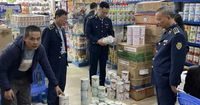Hanoi's commitment to consumer safety has taken a decisive turn as the city embarks on an extensive inspection campaign targeting the production and trade of milk, nutritional foods, and pharmaceuticals. Beginning May 9, 2025, two interdisciplinary inspection teams will conduct surprise checks across the capital until June 15, aiming to ensure compliance with food safety regulations and combat the growing issue of counterfeit products.
The Hanoi People's Committee has initiated this campaign amidst rising concerns over the prevalence of fake medicines, substandard milk, and health-protective foods. The inspections will focus on organizations and individuals involved in the production and trade of these essential goods, a move designed to safeguard public health and restore consumer confidence.
According to the committee's directives, the Hanoi Department of Industry and Trade and the Department of Health have been tasked with providing necessary resources for effective inspections. This includes allocating vehicles and funding for sampling and testing food products. The goal is to ensure that any products found to be unsafe or counterfeit are swiftly dealt with.
In a related effort, the Hanoi Department of Health has announced that it will also conduct surprise inspections of establishments involved in the pharmaceutical sector. This includes pharmacies, drugstores, and medical facilities. If any fake drugs are discovered, the cases will be handed over to the appropriate authorities for further investigation.
From May 9 to June 8, 2025, the Department will implement a peak month dedicated to preventing and combating the distribution of fake and poor-quality drugs. The focus will be on areas deemed high-risk, particularly those near hospitals and concentrated drug trading centers. Inspectors will scrutinize the origin, invoices, and storage conditions of drugs, and will take samples for quality testing.
Dr. Nguyen Van Hai, a representative from the Hanoi Department of Health, emphasized the importance of these inspections, stating, "Our primary goal is to protect consumers from harmful products and ensure that all pharmaceuticals and food products meet safety standards." This initiative comes in response to a growing public outcry over counterfeit goods that have endangered consumer health.
The inspections will not only target food and drugs but also extend to health-protective foods, which have seen a surge in popularity. The city authorities have made it clear that any establishment failing to comply with regulations will be required to rectify their shortcomings swiftly. In cases of severe violations, such as lack of documentation for the origin of products, the authorities will consider revoking business licenses.
The Hanoi People's Committee has previously called for increased cooperation among various agencies to tackle the issue of counterfeit products. The committee has directed local police to monitor the situation closely, ensuring that any violations are detected and addressed promptly. The urgency of this campaign reflects a broader commitment to consumer safety and public health, as the city grapples with the implications of counterfeit goods.
As part of the campaign, specialized projects will be organized to investigate and handle violations related to the production and trade of fake medicines, milk, and health-protective foods. The city police are expected to play a crucial role in this initiative, working alongside health officials to create a safer marketplace for consumers.
Hanoi's actions come amidst a global context where counterfeit goods pose significant risks to public health. The World Health Organization has highlighted the dangers of fake medicines, which can lead to ineffective treatment and even death. In Vietnam, the problem has been exacerbated by a lack of stringent regulations and enforcement mechanisms, making the current inspections a critical step towards safeguarding public health.
In conclusion, as Hanoi embarks on this ambitious inspection campaign, it sends a strong message about the importance of consumer safety and the need for rigorous enforcement against counterfeit products. The success of this initiative will depend not only on the actions taken by authorities but also on public awareness and cooperation in reporting suspicious products. The coming weeks will be crucial in determining the effectiveness of these inspections and their impact on the health and safety of Hanoi's residents.

